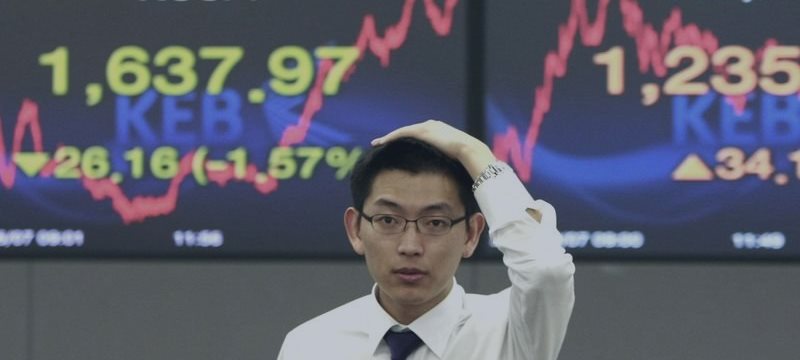On Tuesday Asian markets touched 3,5 year lows.
The Shanghai Composite gauge was down 2.12%.
Australia fell sharply overnight. The main ASX index shed 3.63%, led by heavy declines in the mining and energy sector.
Japan’s Nikkei slumped by 4.05%, or 714 points, to close at 16930. That’s an eight-month low, with every share down today.
Traders were alarmed by Monday’s selloff in Europe - particularly Glencore’s 29% tumble - and in New York.
The news that a Japanese shipping company Daiichi Chuo Kisen Kaisha had filed for protection from creditors also shook Tokyo. It had suffered from the fall in dry freight, as demand for iron ore, copper etc has slumped.
Steven Leung, a director at UOB Kay Hian in Hong Kong, says that markets were falling because investors are afraid of global recession:
“If you look at Japan ... its economy is in bad shape. And economic situation is not good in Europe, either.”
Meanwhile, the European stock markets are all expected to slide this morning, as market players fear volatility, China’s slowdown, and are worried over higher US interest rates.
Chris Weston of IG says that darkness is coming down on markets, as investors scramble to react to recent events.
"Traders and investors alike are being schooled on the importance of adjusting portfolios to the effects of volatility."
"If the global financial crisis taught us anything, it’s that it’s best not to own assets when you don’t understand why they’re going down (especially aggressively). Capital preservation is taking place now before our eyes."
Weston adds that traders are concerned that liquidity is sliding from the financial sector.
Meanwhile, yesterday it was known that Saudi Arabia had withdrawn $70b from outside fund holdings, adding to that of nations such as China who have been drawing down on its foreign exchange reserves.
The liquidity withdrawal is eclipsing the QE injections from the ECB and BoJ and this is causing a tightening of global financial conditions.



